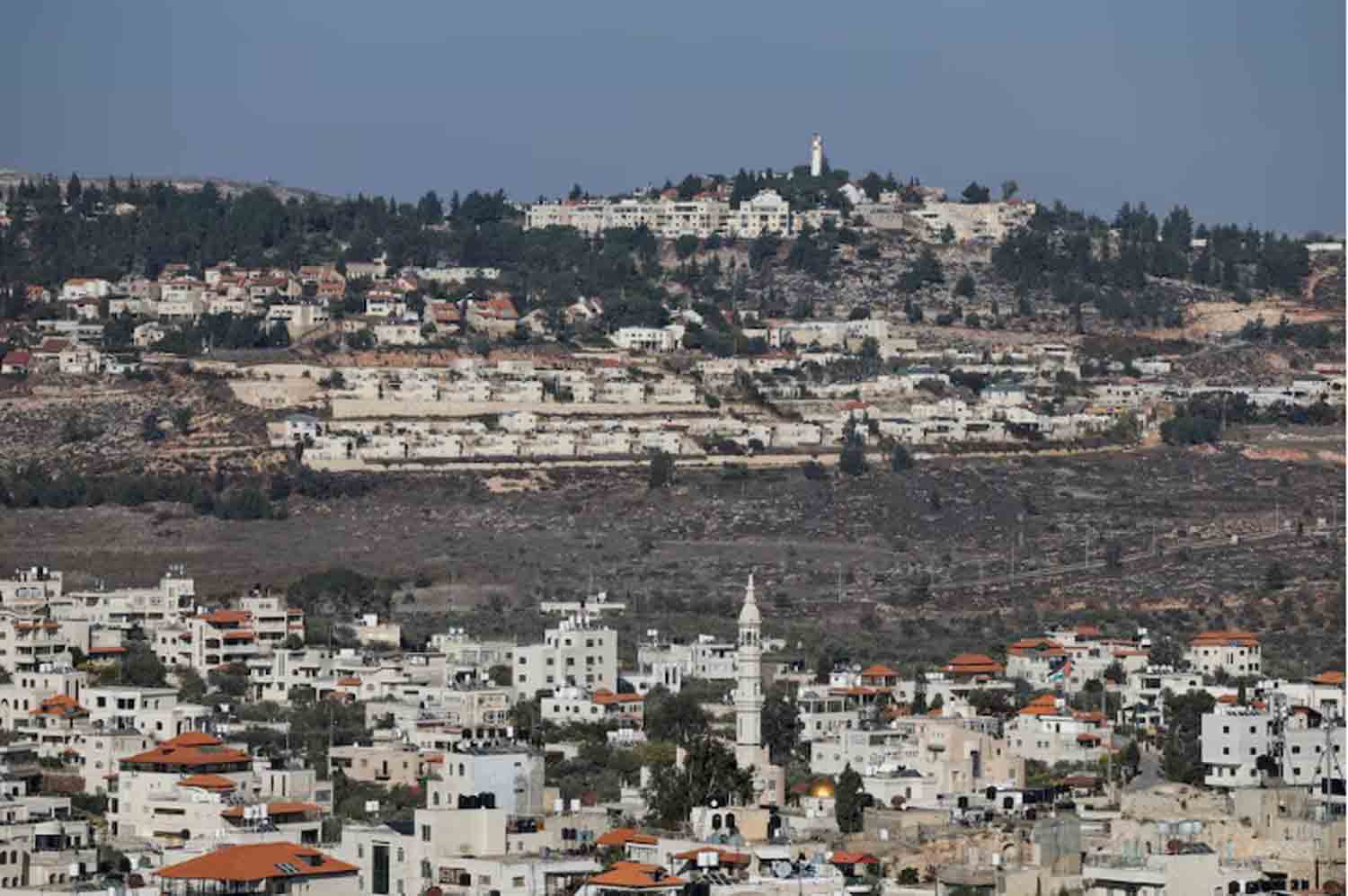Following a significant increase in Israeli settlement activities, certain settler proponents in the occupied West Bank are turning to Donald Trump to realize their aspiration of asserting sovereignty over the region, which Palestinians view as central to their future state.
Since Prime Minister Benjamin Netanyahu returned to power leading a far-right nationalist coalition two years ago, the West Bank has experienced a dramatic expansion of Jewish settlements. This period has also seen a surge in settler violence, prompting sanctions from the United States.
Recently, Israeli flags have begun to appear on hilltops in the Jordan Valley, areas claimed by some settlers, raising concerns among local Palestinians about the potential for increased control over these territories. Some settlers expressed their hopes for Trump’s success prior to the election.
“We are optimistic and somewhat buoyant,” stated Yisrael Medad, an activist and writer advocating for Israel’s annexation of the West Bank, as he spoke to Reuters from his home in the settlement of Shilo, where he has resided for over forty years.
Settlers have welcomed Trump’s appointment of several officials known for their pro-Israel stance, including ambassador Mike Huckabee, an evangelical Christian who has asserted that the West Bank is not occupied and prefers the term “communities” over “settlements.”
In the past month, Israeli government ministers and settler advocates with connections to the U.S. Christian right have increasingly promoted the previously marginal concept of “restoring sovereignty” over the West Bank in their public statements. However, the Netanyahu administration has yet to make any official declaration on this issue, and a spokesperson for Netanyahu’s office declined to provide comments for this report.
It remains uncertain whether Trump will support a strategy that jeopardizes Washington’s goal of a broader agreement under the Abraham Accords aimed at normalizing relations between Israel and Saudi Arabia, a nation that, like many others, does not recognize Israeli sovereignty in the West Bank.
According to Dennis Ross, a former Middle East negotiator for both Democratic and Republican administrations, “Trump’s ambition to expand the Abraham Accords will be a primary focus,” reflecting his understanding of Trump’s foreign policy priorities.
He added, “The Saudis will not seriously consider joining if Israel officially annexes the West Bank.”
Such annexation would effectively extinguish any prospects for a two-state solution that envisions an independent Palestine and would further complicate efforts to address the ongoing conflict in Gaza, which has also affected neighboring Lebanon.
During his first term, Trump relocated the U.S. embassy in Israel to Jerusalem and reversed the longstanding U.S. stance that settlements are illegal. However, in 2020, his proposal to establish a limited Palestinian state along existing borders hindered Netanyahu’s aspirations for Israeli sovereignty over the region.
The president-elect has yet to disclose his intentions regarding the region. Karoline Leavitt, a spokeswoman for the Trump transition team, refrained from addressing policy inquiries, stating only that he aims to “restore peace through strength globally.”
In contrast, Israeli Finance Minister Bezalel Smotrich, a leading advocate for settlement expansion within the government, expressed optimism last week that Israel could annex the West Bank as soon as next year with backing from the Trump administration.
Israel Ganz, chairman of the Yesha Council, which represents Jewish communities in the West Bank, conveyed in an interview his hope that the Trump administration would permit the Israeli government to proceed with its plans.
Prior to the November 5 election, Ganz led a prayer gathering for a Trump victory at the site of an ancient Byzantine basilica in Shilo. “We prayed for divine guidance towards better days for both the United States and Israel,” he remarked. Shilo has been a favored destination for U.S. politicians, including Mike Huckabee and Pete Hegseth, Trump’s nominee for Secretary of Defense.
Recently, Huckabee informed Arutz Sheva, an Israeli news platform associated with Smotrich’s Religious Zionism movement, that any decisions regarding annexation would rest with the Israeli government. He has not yet responded to requests for further comments.
Wasel Abu Yousef, a senior official in the Palestine Liberation Organization, asserted that any actions taken by the Israeli government “will not alter the reality that this land belongs to the Palestinians.”
Shilo, along with the adjacent settlement of Eli, is located near the center of the West Bank, approximately an hour’s drive from Jerusalem via Route 60, a well-maintained highway that starkly contrasts with the deteriorating roads linking the Palestinian cities in the region.
Bashar al-Qaryouti, a Palestinian activist from the nearby village of Qaryut, expressed concerns that the growth of Shilo and Eli has effectively encircled Palestinian villages in central West Bank.
Al-Qaryouti noted a rise in settlers constructing homes without waiting for official permits from the Israeli government, a trend also observed by Peace Now, an Israeli organization that monitors settlement activities.
“This is occurring in real time,” Al-Qaryouti stated in a phone interview with Reuters. “Settlers now control vast areas across the central West Bank.”
The West Bank, referred to by many in Israel as Judea and Samaria based on historical Biblical references, is a kidney-shaped region measuring about 100 km (60 miles) in length and 50 km (30 miles) in width. It has been a focal point of the Israeli-Palestinian conflict since Israel captured it during the 1967 Middle East war.
Most nations regard this territory as occupied and consider the settlements illegal under international law, a stance reaffirmed by the U.N.’s highest court in July.
According to U.N. estimates, around 750,000 Palestinians were displaced during the establishment of Israel in 1948. Palestinians view the West Bank as the core of a future independent state, alongside the Mediterranean enclave of Gaza to the south.
However, the proliferation of Jewish settlements, which have expanded significantly across the West Bank since the Oslo interim peace accords three decades ago, has dramatically altered the landscape.
Modern Shilo, recognized as the location of the tabernacle established by the ancient Israelites following their return from Egyptian exile, was founded in the 1970s. It resembles a gated community characterized by tranquil streets and well-maintained suburban residences, with a population of approximately 5,000 in 2022.
Proponents of Jewish settlements assert that their Biblical ties to the land justify their presence, regardless of international legal perspectives. “Even if the Byzantines, the Romans, the Mameluks, and Ottomans ruled it, it was our land,” stated Medad.
Consequently, advocates for the settlements dismiss the term “annexation,” arguing that it implies the appropriation of foreign territory.
In 2023, construction of settlements in the West Bank reached unprecedented levels. Following the outbreak of conflict in Gaza last October, numerous new roads and construction projects have significantly altered the landscape of the region.
Despite criticism from the Biden administration, these developments have continued unabated. Concurrently, incidents of violence perpetrated by Jewish settlers against Palestinians in the West Bank have escalated, particularly around Shilo, prompting international outrage and recent sanctions from the U.S. and Europe against individuals identified as key participants.
Settler leaders, including Ganz, maintain that violence is incompatible with their movement. They argue that their presence in areas adjacent to Palestinian towns and cities enhances security for the broader Israeli population.
A series of measures have been implemented to strengthen Israel’s presence in the West Bank since the formation of Netanyahu’s government, which includes a coalition agreement affirming “The Jewish people have a natural right to the Land of Israel.”
“We are making significant changes on the ground to establish the reality that Israel is present in Judea and Samaria,” stated Ohad Tal, chairman of Smotrich’s parliamentary faction, while a red Trump MAGA hat sat on a shelf in his Knesset office.
A comprehensive framework has been developed “to effectively assert sovereignty in Judea and Samaria, ensuring that the Jewish presence is an irreversible reality.”
Responsibilities related to settlements that were previously managed by the military have now been transferred to the Settlement Administration, a civilian entity directly accountable to Finance Minister Smotrich, who also oversees the defense ministry, thereby managing operations in the West Bank.
In 2024, nearly 6,000 acres (2,400 hectares) have been designated as Israeli state land, a classification that facilitates settlement construction, marking the largest annual increase on record and representing half of all areas designated as state land in the last thirty years, according to a report by Peace Now in October.
Over the past year, at least 43 new settler outposts have been established, a significant rise compared to an average of fewer than 7 annually since 1996, as indicated by a separate analysis from Peace Now.
The outposts, typically extensions of established communities situated on adjacent hilltops, facilitate the growth of the original settlements by providing several kilometers of new roads and infrastructure. Many of these developments have been constructed in violation of Israeli law, yet the Yesha Council reports that nearly 70 of them received government backing this year.
“It’s a strategic move because they appear unremarkable,” commented Ziv Stahl, a director at Yesh Din, an Israeli organization that monitors settlement activities. “They are not formally declaring, ‘We are annexing the West Bank’; instead, they are simply proceeding with the actions.”
Discover more from Defence Talks | Defense News Hub, Military Updates, Security Insights
Subscribe to get the latest posts sent to your email.





